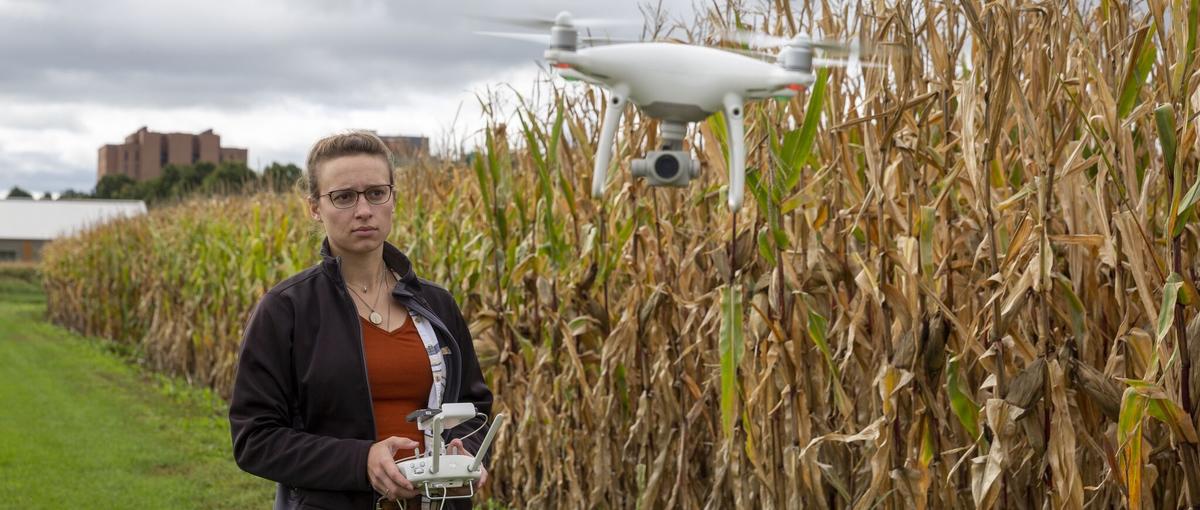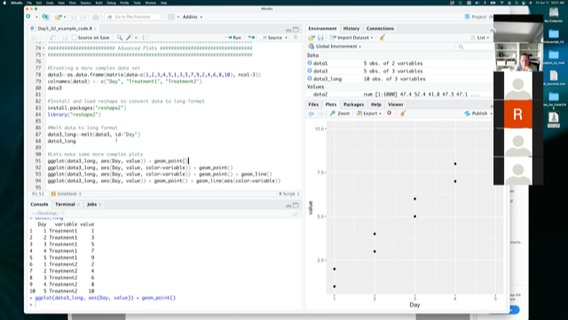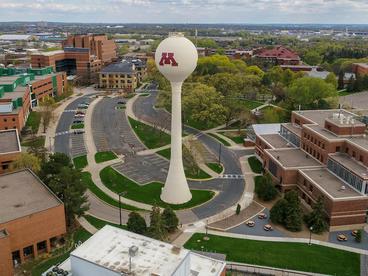
July 28, 2021 | Jennifer Howard ([email protected])
"New technology requires people who know how to use it," said Rex Bernardo, University of Minnesota professor and director of the University’s new Plant Breeding Center. "Our 2021 Summer Institute catered to professional plant breeders and students who want to learn about the latest tools and approaches in plant improvement."
Continuing education—optional yet essential
Unlike other fields such as healthcare and law, the plant breeding industry does not require continuing education, but the pace of change in plant improvement techniques and technology makes lifelong learning essential. However, staying current in a developing field is a challenge. Industry professionals often lack the time or access to emerging methodology, and graduate students at some universities might not have access to highly specialized courses in their home institutions. The Plant Breeding Center's first Summer Institute opened access to all.
New Plant Breeding Center fills a void
UMN’s new Plant Breeding Center aggregates the University's core strengths in plant improvement through collaboration, continuing education, community building, and promotion. Faculty from several College of Food, Agricultural and Natural Resource Sciences departments have allied to leverage, promote, and share their plant breeding expertise through the center's activities.
For its debut event, the Plant Breeding Center offered its first week-long Summer Institute online on June 7-11, 2021, to address the need for student and professional development. Attendees chose from five educational modules, three of which were condensed versions of the University's semester-long courses.
- Applied Plant Genomics and Bioinformatics (Candice Hirsch, UMN)
- Machine Learning Applied to Plant Science (Tolutola Oyetunde, Takeda)
- Modern Biotechnologies for Crop Improvement (Robert Stupar, UMN)
- Plant Phenomics (Sindhuja Sankaran, Washington State University)
- Genomewide Markers in Plant Breeding (Rex Bernardo, UMN)
"Our goal for the Summer Institute was to offer bite-size increments on topics that are rapidly changing in the industry," Bernardo said. "These topics demonstrate the breadth of expertise in plant improvement from our newly formed Plant Breeding Center."

Summer Institute draws attendees from around the world
A global audience of 124 attendees from Minnesota to Brazil, Sweden, Kenya, Thailand, and other countries in between took advantage of this digital convergence of plant breeding knowledge. The Summer Institute's faculty used Zoom’s online breakout rooms to form small cohorts for hands-on computer simulations and deep interaction. Participants appreciated the online convenience of attending seminars while still meeting daily professional responsibilities.
One attendee celebrated new strategic guidance that could accelerate analytical decision-making. "I learned that it is important to think about your crop, your strategy (e.g., genomic selection or not), number of markers, number of individuals, heritability of the trait, number of traits, testing locations, and how they are interconnected when setting up breeding programs that are assisted by markers. There is one way to Rome, but you can make smart decisions to save money and time."
The Summer Institute welcomed an equal proportion of graduate students and industry professionals, providing diverse interactions and allowing students to hear about the challenges that plant scientists face in the real world. Participants heralded the combination of challenging topics and hands-on application.
"I enjoyed how first the concepts were presented, and then we had real-life data/results to look at how those concepts applied. I also enjoyed running the "breeding games" programs where we got to make decisions using genomewide prediction. Overall, it was a great course!" said one 2021 Summer Institute participant.
The Plant Breeding Center offered Summer Institute scholarships to seven attendees nominated by the International Maize and Wheat Improvement Center. The center's faculty hope to provide scholarships for the event again in 2022.

Industry & education game changers
UMN is publicly known for its prolific plant breeding programs, apples being the most well-known by most Minnesotans. Outwardly, breeding progress appears slow. Varietal improvements in apple, for example, have historically taken 20-25 years from the first parent crosses to a commercial variety release.
But in recent years, plant breeding has been revolutionized by enormous technological gains in gene mapping, marker-assisted breeding and induced variation. These advances will increase the quantity and pace of variety releases—welcome news to growers and foodies alike.
With more data types, tools and information at a breeder’s disposal, continuing education has become vital to academic and professional progress.
"If you were educated even ten years ago, there are new topics in biotechnology and machine learning you couldn’t have imagined. Today, breeders must decide to dive into the new opportunities or settle for the ways of the past," Bernardo said.
Expanding access to plant improvement education
UMN’s 2021 Summer Institute was the Center’s first, fashioned after other successful university and European intensives.
"In university education, we typically think of graduate and undergraduate students pursuing a degree in semester-long courses," Bernardo said. "But we’re shifting; not only to enable robust online education but also shorter formats that make it easier for a variety of attendees to participate."
Bernardo cites a spring 2021 online semester course as an example of this transition. "We had 33 attendees from multiple countries. It was a significant time commitment that we know not everyone can make. But people want refresher courses to stay up to date. I’m glad we can offer new formats like the Summer Institute to address that need."
2022 Summer Institute planning

With the resounding success of the 2021 event, plant breeding faculty are already planning for 2022. Next year’s Summer Institute will be held on the Twin Cities campus instead of online. "We know different formats appeal to different audiences. So we are planning to alternate online and in-person years."
One advantage to the in-person event will be an increase in seating. Online modules were capped at 35 attendees to facilitate interaction. But in person, Bernardo says that small group gatherings are easier to teach and manage. The group is also considering a divided week schedule that would allow attendees to enroll in two sessions. The 2021 format limited registrants to one module.
The 2022 topics and instructors list has not been finalized but will likely include a repeat of some 2021 courses and some new additions.
If you are interested in attending the June 2022 Summer Institute, stay tuned to the Plant Breeding Center’s social media sites and webpage or subscribe to our mailing list. A save-the-date announcement with further details will be published in the fall. Formal registration will open in January 2022.
Driven to Discover
UMN's Plant Breeding Center was established in 2020 to serve as a hub for leveraging Minnesota strengths in plant breeding research, varietal development, and graduate education.
The Center is managed through the Department of Agronomy and Plant Genetics and the Department of Horticultural Science in the College of Food, Agricultural and Natural Resource Sciences.